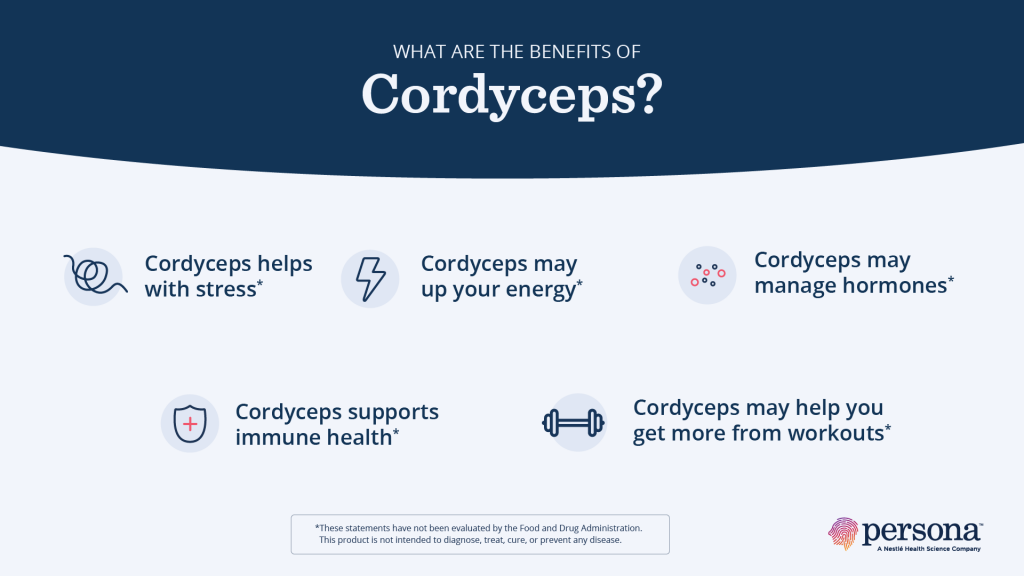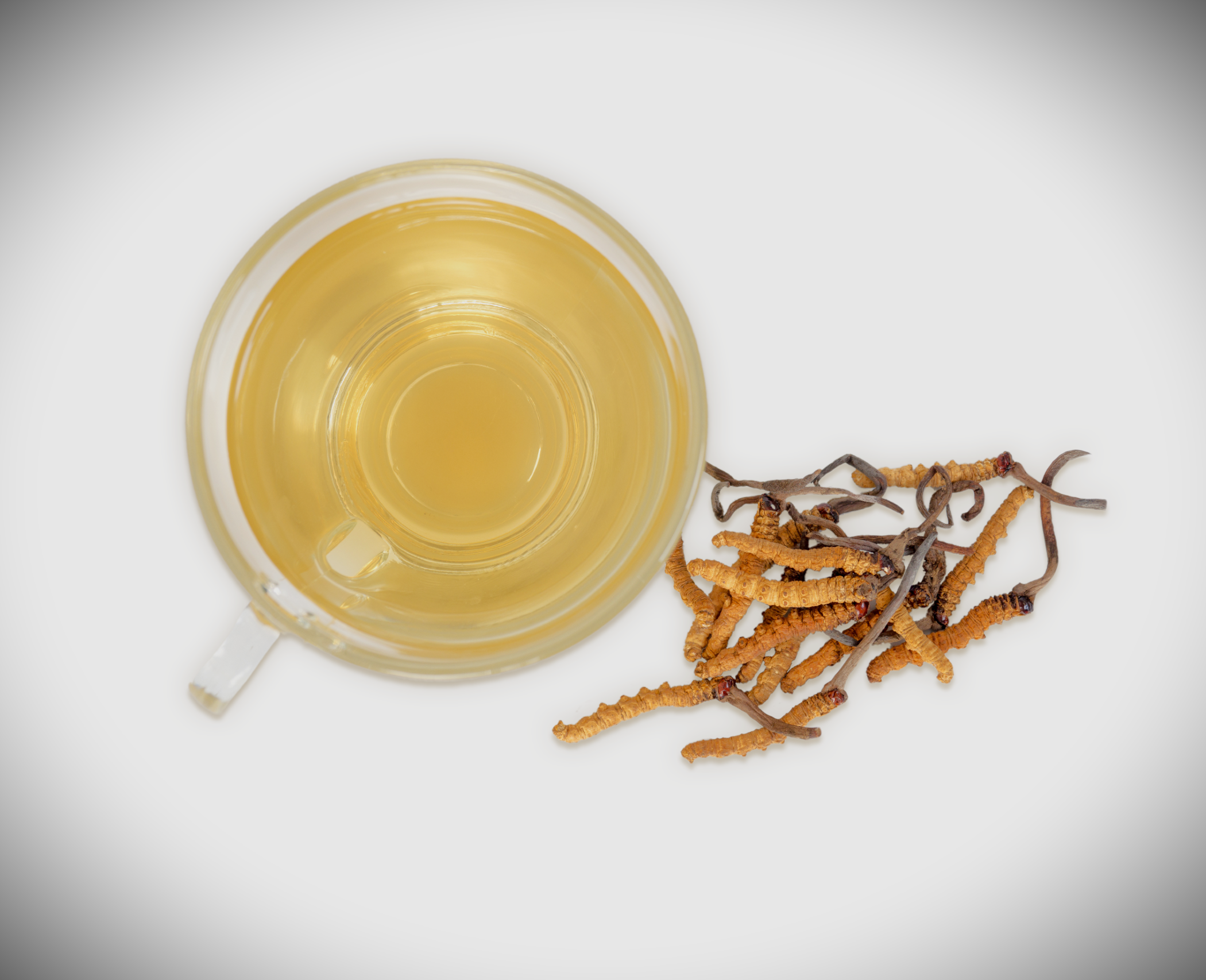With HBO’s fungus-fueled thriller The Last of Us the talk of watercoolers across the country, there’s a new question at the top of people’s minds: Will cordyceps—a popular mushroom supplement—turn them into superhuman, flesh-gnawing zombies? The short answer, I’m happy to report, is no.
But as a powerful adaptogen, this age-old remedy does do things for your body and mind that you might find really helpful, especially if you’re coping with stress. Read on to learn how this mighty mushroom works, and what it can do for you in your daily life—with no cannibalistic side effects.
What is cordyceps?
Cordyceps is an adaptogenic fungus that’s been used in Tibetan and Chinese remedies for centuries. If you’re not familiar with adaptogens, here’s the gist: They’re plants that help your body adapt to stress, fatigue, nervousness and other challenges—and lessen the symptoms. Each adaptogen has its own unique profile that can help you target your body’s specific needs.
Cordyceps, a group of parasitic fungi that grow on other organisms (no, not humans), includes more than 400 species, but there are just two that tend to show up in supplements:1
Cordyceps sinensis
Also known as the caterpillar fungus, this species is native to the Himalayas—and is the likely inspiration for HBO’s horror series. It grows on the larvae of insects and arthropods by infecting the host and hijacking its nervous system. It forces the host to climb up a tree, where the fungus kills it and grows spores out of its head. No joke. Because of this unusual (and gross) way of reproducing, the caterpillar fungus is difficult to farm, but is also naturally hard to come by in the wild. In fact, it’s one of the most expensive wild mushrooms in the world—costing about $20,000 per kilogram.
Cordyceps militaris
This one is sometimes referred to as mushroom cordyceps because it grows on other fungi or grains instead of insects. And unlike the caterpillar fungus, it’s easily cultivated around the world, meaning it’s the one you’ll likely find in supplements. And while this species isn’t as prized, it shouldn’t be snubbed: Its benefits are still amazing—and more budget-friendly!

What are the benefits of cordyceps?
1) Cordyceps helps with stress*
You probably already know that persistent stress can be tough on your body. But it’s especially hard on your adrenal glands, which make your stress hormones like cortisol. Prolonged stress can overburden them, causing adrenal fatigue and a laundry list of symptoms like brain fog, tiredness, poor mood, weight gain and more. Cordyceps helps your adrenal glands to restore balance and function well.
2) Cordyceps may up your energy*
Looking to up your oomph without the jitters? Cordyceps may help increase energy and improve mood.* This is still being researched, but experts think cordyceps improves oxygen and blood flow to your brain, helping you feel more alert. It may also affect neurotransmitters like dopamine and serotonin, brain chemicals that not only impact your mood but also play a role in your sleep-wake cycle. There’s no caffeine or stimulant in cordyceps, so you can expect a steady and gentle effect, rather than big ups and downs.
3) Cordyceps may help you get more from workouts*
If you want to up your gym game or run a marathon, add cordyceps to your pre-workout diet. It’s believed to help with both endurance and performance by increasing your body’s production of cellular energy (ATP).* This gives your muscles more energy and improves your body’s use of oxygen during exercise according to a small study.2
4) Cordyceps and immune health*
Cordyceps has antioxidant properties to fight free radicals, natural substances that damage cells and weaken your immune system in high concentrations.* It also helps strengthen your immune response by increasing the production of your white blood cells—your body’s first line of defense against invaders.3*
5) Cordyceps may manage hormones*
Besides restoring your adrenals and cortisol levels, cordyceps is also thought to help balance testosterone and thyroid hormones. Though more research is needed, it may help improve libido, metabolism and even ease cravings.*
How can I take Cordyceps?
Cordyceps is most commonly available as capsules, liquid extracts, tea and powders that can easily be added to drinks or smoothies. You’ll find it in various strengths and sometimes in a blend with other adaptogens. And though not as common, you can also get cordyceps dried whole,—a great option for soups or broth.
Is Cordyceps safe?
Cordyceps—which won’t turn you into a zombie—is generally considered safe when taken in recommended doses. But like other dietary herbs, it shouldn’t be taken during pregnancy or while you’re breastfeeding. It may also interact with some medications, specifically certain blood thinners. If you’re concerned about the potential risks or interactions with cordyceps, check with your doctor to see if it’s safe for you.
Want to learn more about adaptogens? Check out: Does fermented ginseng help relieve stress?
About Gabby
Gabby is a Nutritionist with a master’s degree in strategic communications. She loves using her nutrition-fluency with storytelling to encourage positive change. Before Persona, she worked at a mental health clinic helping clients manage stress, anxiety and other mental health issues through diet.
Do you have questions about supplements? Reach out to one of our experts, or take Persona’s free nutrition assessment, and learn exactly what you need to take your wellness to the next level.
*These statements have not been evaluated by the Food and Drug Administration. This product is not intended to diagnose, treat, cure, or prevent any disease.
This information is not intended as a substitute for the advice provided by your physician or other healthcare professional, or any information contained on or in any product label or packaging. Do not use the information from this article for diagnosing or treating a health problem or disease, or prescribing medication or other treatment. Always speak with your physician or other healthcare professional before taking any medication or nutritional, herbal, or homeopathic supplement, or using any treatment for a health problem. If you have or suspect that you have a medical problem, contact your health care provider promptly. Do not disregard professional medical advice or delay in seeking professional advice because of something you have read in this article.

